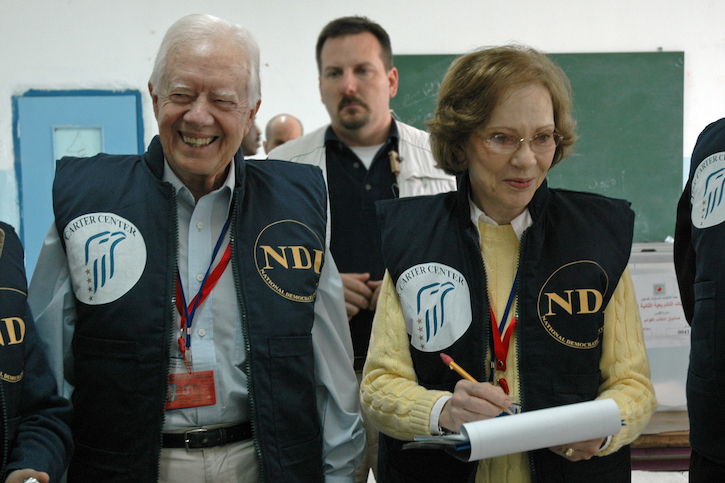
The name change to the Jimmy and Rosalynn Carter School for Peace and Conflict Resolution serves as a tribute to the Carters’ steadfast commitment to peacemaking through nonviolence and the transformative role of dialogue and diplomacy in conflict resolution. Photo courtesy of The Carter Center.
In the midst of a pandemic that pushed the spring 2020 semester online, George Mason University’s School for Conflict Analysis and Resolution (S-CAR) was undertaking the largest change in its 40-year history—becoming the Jimmy and Rosalynn Carter School for Peace and Conflict Resolution.
It was a move that put the school’s expertise to the test.
“The renaming of an institution could easily be a dividing process, but we managed to use our own expertise in conflict resolution and peacebuilding to make our renaming process a peaceful one,” said Carter School Dean Alpaslan Özerdem. “The most amazing part of this story is that we have done all this in the midst of a pandemic.”
The switch also occurred during changes in senior leadership, as Mason transitioned between provosts and university presidents. In the process, the school has emerged “more united and with a clearer vision for our future,” Özerdem said.
That vision is inspired by the school’s namesakes, he said.
“With the emphasis on ‘peace’ in our title, we are re-defining our vision in light of the Carters’ legacy in peacemaking, human rights protection and socio-economic development of vulnerable populations,” Özerdem said. “Our future work will integrate peace and justice in a symbiotic relationship.”
What’s going to be different about the Carter School?
“The main change is to ensure a much greater engagement with different actors outside academia, whether they are state departments, legislators, civil society organizations, the private sector or the general public,” Özerdem said. “My goal is for the Carter School to become the go-to place for all matters of peace and conflict resolution, whether for study, research or community engagement.”
One highlight is the new Peace Labs initiative, which will facilitate collaboration between the Carter School and Mason’s other schools and colleges.
The focus will be on cutting-edge research, Özerdem said, such as a Peace Engineering Lab in partnership with the Volgenau School of Engineering to explore new ways of using big data and artificial intelligence for conflict prevention and peacebuilding. Other areas for collaboration may include work around climate change with the College of Science, and a lab on social justice with Mason’s College of Humanities and Social Sciences. The Carter School will also be playing a role in Mason President Gregory Washington’s Anti-Racism Task Force
Other new initiatives include:
- A collaboration with Arlington County and Fairfax City on police, justice and education reform programs;
- The Carter School Political Leadership Academy, which will train citizens running for office in conflict resolution skills;
- A new graduate certificate in contemporary dispute resolution, focusing on resolving disputes that arise in home and work environments;
- The Carter School Buddy Program, through which new students from undergraduate to doctoral levels are being paired with a student mentor; and
- Carter School Peace Week, which aligns with the United Nations’ International Day of Peace on Sept. 21 and includes events on peace and justice.
“To ferry S-CAR through the Carter School name change has been the most exciting leadership experience,” Özerdem said. “We showed we can work together, overcome challenges and excel—that’s what I’m really proud of.”
